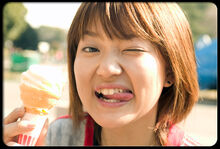
Tourette's syndrome (or Gilles de la Tourette's syndrome) is an inherited neurological disorder with onset in childhood. Children with Tourette's syndrome have a higher risk of developing certain mental health conditions including attention-deficit/hyperactivity disorder (ADHD), Obsessive-compulsive disorder, depression and anxiety disorders. It is named after Georges Gilles de la Tourette (1857–1904), a French neurologist who first described its signs and symptoms in 1884.
Causes[]
Until now, the exact causes Tourette's syndrome are not known including its exact and perfect treatment. Although there are a number of theories which try to explain this disorder. Some of the major theories are listed below:
- Genetic connections: No specific gene has been found to give any genetic condition to Tourette's syndrome. However, some studies involving twins suggest that this condition may have a genetic basis.
- Abnormalities in brain structure: Images of children and adults with Tourette's syndrome suggest that some regions of the brain may be abnormal, particularly the basal ganglia region, the frontal lobes and the cortex.
- Abnormalities in brain chemicals: It is believed that imbalances in certain brain chemicals like neurotransmitters (including dopamine and serotonin) have a role in the development of Tourette's syndrome.
- Certain infections: Some researches suggest a link between childhood streptococcal streptococcus infections and Tourette. Streptococcus are bacteriae causing diseases like meningitis, bacterial pneumonia, etc.
None of these theories have been proved conclusively and continue to be debated further.
There are certain risk factors that may contribute to the development of Tourette's syndrome: a family history of the disorder, being a male, and premature birth.
Treatment & care[]
There is no known cure for Tourette's syndrome. The treatment largely involves controlling the symptoms of tics and the related psychosocial issues arising out of the bothersome tics. The treatment may be grouped under three broad categories:
- Medications: Some medications may minimize the effect of tics but can not completely cure the disorder. Such medications may use certain types of antipsychotic, antidepressant, stimulant medications and central adrenergic inhibitors. In many cases benefits outweigh resulting side effects.
- Psychotherapy: Psychotherapy is helpful in two ways. Firstly, it may help the people affected with Tourette's syndrome to cope with emotional aspects. Secondly, it helps in reducing the symptoms of accompanying disorders like attention-deficit/hyperactivity disorder (ADHD), obsessive-compulsive disorder, depression and anxiety disorders.
- Deep brain stimulation: This is a new experimental treatment for young adults or adults with severe symptoms that are not adequately controlled with either of the above. It is intended to work like a pacemaker for brain instead of the heart, and it is only appropriate for people with severe tics that have a significant impact on their daily lives. It is not recommended for children and is not yet approved for use by the United States' Food and Drug Administration, but several clinical studies have shown it can be used safely and effectively in adults with severe symptoms.[1]
In any case, no treatment is required if the symptoms are not severe.
Normally, it is very difficult to get over and control the tics. However, stress management techniques, ensuring to have sufficient sleep, and doing mental or physical activities that may work as distractions may help in reducing the severity of the tics.
